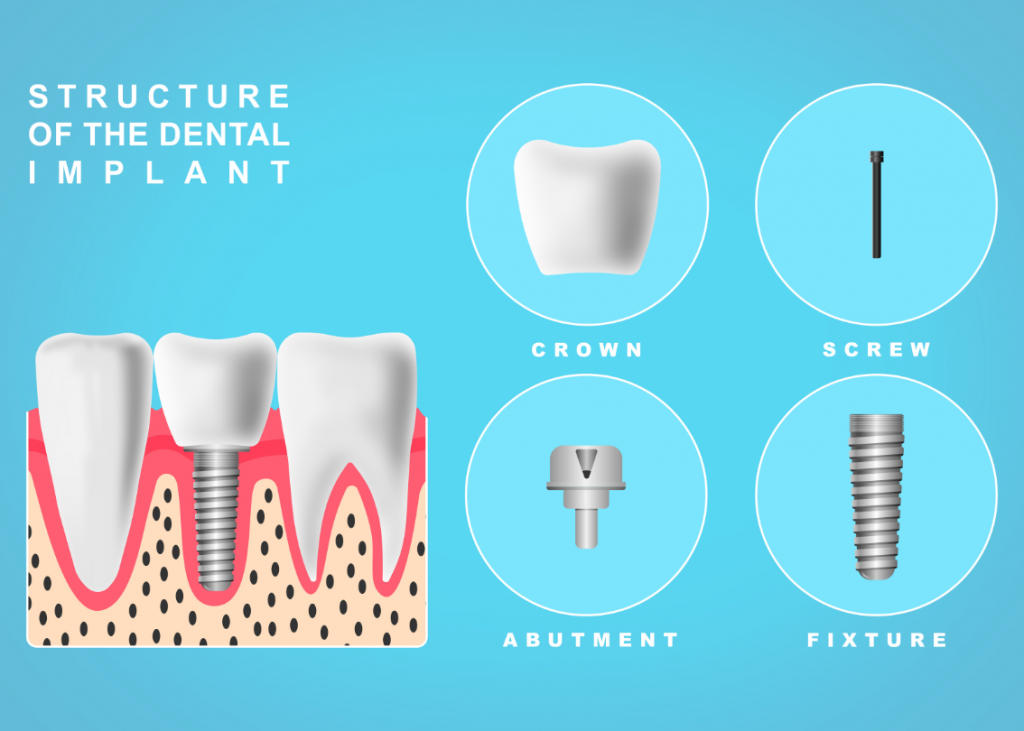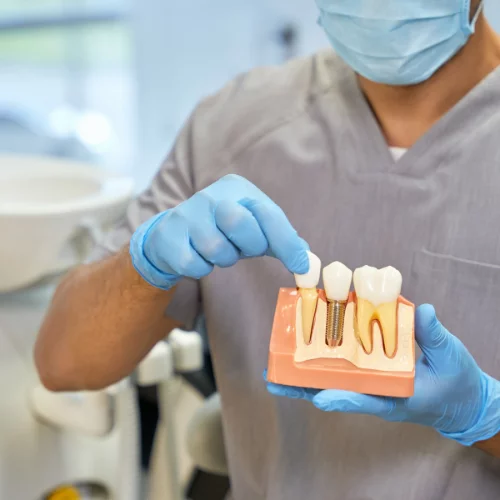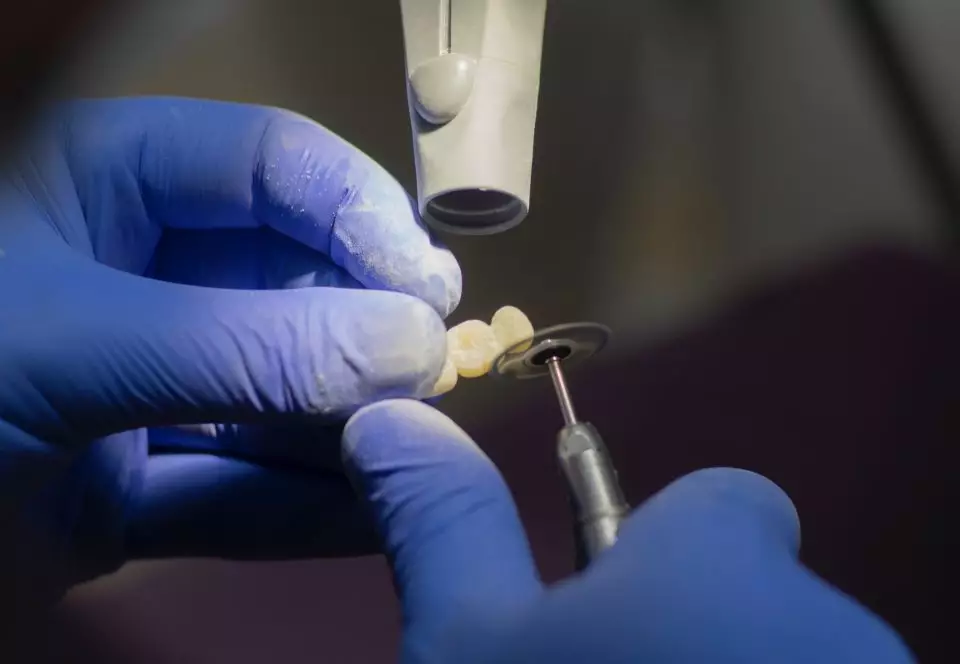
The Truth About Invisalign and Snoring: What You Need to Know
February 29, 2024
The Truth About Missing Front Teeth
March 18, 2024Key Takeaways:
Understanding Dental Implants:
Dental implants are sophisticated devices designed to mimic natural teeth using titanium posts implanted into the jawbone surgically. Their purpose is aesthetic enhancement, improved chewing function and prevention of bone loss; through osseointegration the titanium post bonds with jawbone for stability when used as prosthetic foundation for crowns, bridges or dentures.
Benefits of Dental Implants:
- Improved Appearance: Dental implants significantly enhance the look and structure of smiles and facial structures by seamlessly integrating with natural teeth.
- Better Chewing and Speaking Function: Dental implants help enhance chewing abilities and speech clarity, restoring oral functionality without slippage or discomfort.
- Long-Term Solution: Dental implants provide a long-term and secure option for replacing missing teeth, with an impressive success rate and the potential to last a lifetime with proper care.
Cost and Alternative Solutions:
- Cost Factors: The costs associated with dental implants depend upon several variables, including material choice and additional procedures like bone grafting; as well as provider expertise and experience.
- Financing Options: Many dental clinics provide financing plans to make dental implant treatments more financially accessible for their patients.
- Alternatives: Dental bridges, partial dentures, and other tooth replacement solutions offer alternatives to dental implants that meet individual needs and preferences for tooth loss replacement.
Although dental implants may require greater upfront expenses, their long-term advantages in terms of improved oral health, functionality, and confidence often outweigh these upfront expenses – making them a worthwhile solution for tooth replacement.
Are you thinking about getting dental implants but not sure how much to replace teeth with implants? In the following, we’ll go over everything you need to know about the cost of replacing teeth with implants. From cost factors to average dental implant costs, we will provide you with all of the information you need to make an informed decision.
Therefore, if you’re curious about the financial implications of dental implants, continue reading to learn more.
What Are Dental Implants
Dental implants in Matthews NC are advanced dental devices that imitate the structure of natural teeth to replace lost ones. They are made out of a titanium post or screw-like device that is surgically placed into the jawbone and acts as a strong anchor for prosthetic teeth such crowns, bridges, and dentures.

Implants are well-known for their ability to closely mimic the shape and function of natural teeth, giving not only aesthetic benefits but also restoring appropriate chewing function and reducing bone loss in the jaw. The titanium post bonds with the surrounding bone over time via a process known as osseointegration, forming a strong and lasting basis for the replacement tooth.
This integration keeps dental implants stable and secure, allowing patients to enjoy a confident smile and better oral health for years to come. Dental implants, whether used to replace a single tooth, numerous teeth, or a complete arch, provide a long-term solution that increases general health and quality of life.
How Are Teeth Replaced with Dental Implants
Dental implants are used to replace teeth and are inserted into the jawbone during a surgical procedure.
This implant provides a solid base for the artificial tooth, matching the natural root structure. Following installation, a process known as osseointegration occurs in which the jawbone bonds with the implant, resulting in exceptional stability.
Once the implant has fused successfully, a dental prosthetic, such as a crown, bridge, or denture, is attached to restore the patient’s smile’s aesthetics as well as functionality. This complete procedure ensures that the replacement tooth is stable, long-lasting, and integrates with the surrounding teeth.
Benefits of Dental Implants
Dental implants have various advantages, including a better appearance, increased eating and speaking function, and a high success rate.
These little titanium posts act as robust roots for artificial teeth, giving stability and aiding in the maintenance of the jawbone tissue. Implants, unlike dentures, do not rely on adjacent teeth for support, which helps to maintain overall dental health.
Patients frequently report feeling more confident in their smiles and being able to eat whatever they want without fear of slippage or discomfort. With proper care, dental implants can last a lifetime, providing a permanent and dependable alternative for replacing missing teeth and restoring oral function.
Improved Appearance
One of the key benefits of dental implants is the significant improvement in the appearance of the smile and facial structure.
By seamlessly blending with the natural teeth, dental implants not only enhance aesthetics but also restore the functionality of the missing tooth. Through the integration of dental crown placement, these implants provide a durable and long-lasting solution that mimics the look and feel of natural teeth.
This cosmetic improvement can have a positive impact on an individual’s self-esteem and confidence, as it allows them to confidently showcase a beautiful, natural-looking smile. Find out what is cosmetic dentistry.
Better Chewing and Speaking Function
Dental implants help improve chewing abilities and speech clarity, allowing people to have a more natural and useful oral experience.
Dental implants serve an important part in restoring overall oral functionality by establishing a secure basis for replacement teeth. This stability not only helps with eating efficiency, but it also improves speech clarity by eliminating slurring or mumbling caused by missing teeth.
Implants merge easily with existing teeth by matching their natural structure, resulting in a complete and harmonious smile. This restoration of normal dental capabilities can considerably improve confidence and quality of life for people who choose dental implant treatment.
Long-term Solution
Dental implants offer a long-term alternative for tooth replacement, with durability and stability that can last a lifetime if properly maintained.
These implants are intended to merge with the jawbone, replicating the natural tooth structure and providing a solid foundation for replacement teeth. Because of their biocompatibility, implants have a high success rate, with many patients reaping the advantages for decades.
Dental implants are a practical choice for those seeking a permanent solution to missing teeth because they require less maintenance than other choices, eliminating the need for periodic adjustments or replacements.
Cost of Replacing Teeth with Implants
The cost of replacing teeth with implants varies depending on factors such as the type of implant material used and the availability of affordable dental implant financing options.
It’s essential to consider not only the upfront cost but also the long-term benefits of dental implants in terms of improved oral health and quality of life. Many clinics offer financing plans to help patients manage the expenses associated with dental implant treatment.
Factors Affecting the Cost
The cost of dental implants is determined by several factors, including the procedure’s intricacy, the necessity for future procedures, and the initial consultation charge.
The cost of a consultation varies depending on the dental provider’s expertise, with experienced experts often charging more. In addition to the surgical costs of implant placement, patients may need to pay for additional treatments such as bone grafting or sinus lifts. These additional procedures can greatly increase the entire cost of implant treatment.
Individuals seeking dental implants should extensively explore all potential costs with their dentist and inquire about payment plans or financing options to manage the financial aspects of the process.
Average Cost of Dental Implants
The average cost of dental implants varies depending on the grade of materials used and the additional services required.
Usually, the cost of dental implants is determined by the type of implant, any necessary preparatory treatments like bone grafting, and additional treatments like dental anesthesia or bespoke abutments, which may further impact the overall cost.
It is critical to remember that, while the initial expenditures may appear considerable, the long-term benefits of dental implants, such as better oral health and self-confidence, frequently outweigh the financial investment.
Alternatives to Dental Implants
Dental bridges, partial dentures, and other top tooth replacement options tailored to individual needs and preferences are available in addition to dental implants.
Bridges are fixed prosthetic devices used to replace lost teeth, attached to existing teeth or implants, providing stability and preventing neighboring teeth from moving. However, they require healthy adjacent teeth for support, potentially requiring structural changes.
Dentures, on the other hand, are detachable prosthetic prostheses designed to replace several lost teeth. They are less expensive than implants, but may not offer the same level of comfort and stability.
Dentures
Dentures are a typical tooth replacement option that offers a detachable alternative for people who are missing several teeth.
They provide a versatile option for those seeking tooth replacement without the necessity for surgical procedures such as dental implants. One of the primary benefits of dentures is their low cost compared to other solutions on the market, making them available to a wider spectrum of people.
Dentures are generally straightforward to maintain, requiring only regular cleaning and occasional adjustments from a dental professional. They also let people regain chewing and speaking skills while also enhancing their overall oral health. Ask your dentist how to take care of your dentures.
Bridges
Dental bridges are fixed prosthetic devices that replace missing teeth by anchoring artificial teeth to adjacent natural teeth or dental implants.
These bridges not only fill gaps in a patient’s smile but also play a crucial role in maintaining proper alignment of surrounding teeth, preventing them from shifting into the space left by the missing tooth.
By distributing the forces from chewing evenly across neighboring teeth, bridges help to avoid excessive stress on individual teeth, which can lead to issues such as fractures or misalignment.
Bridges can be customized to blend seamlessly with the natural teeth, providing a natural appearance and restoring functionality to the patient’s bite.
Partial Dentures
Partial dentures are removable appliances used to replace one or more missing teeth, offering a versatile tooth restoration solution for various dental conditions.
These dental devices are carefully designed to blend seamlessly with the natural teeth, ensuring a comfortable and natural-looking fit for the wearer. The fitting process typically involves taking precise impressions of the patient’s mouth to create a customized and precise fit.
By filling in gaps caused by missing teeth, partial dentures not only enhance the appearance of the smile but also help maintain the proper alignment and function of the remaining teeth. This restoration option provides a cost-effective and convenient way to improve both dental aesthetics and oral functionality.
How to Choose the Right Dental Implant Provider
Choosing the right dental implant provider entails evaluating credentials, expertise, patient testimonies, and the quality of materials and technology used in the treatments.
When selecting a dental implant specialist, it is critical to prioritize experience in implant dentistry. Look for a practitioner who has had specific training and is certified in implant implantation.
Consider past patients’ feedback to determine their general happiness with the specialist’s work. Technological improvements have a huge impact on the effectiveness of dental implant treatments, so choose a physician who keeps up with the latest instruments and techniques in the field.
Evaluating the specialist’s success rates and the longevity of their results will help you make a more informed decision.
Check Credentials and Experience
When selecting a dental implant provider, it is critical to check their credentials, experience, and specialization to ensure they have the appropriate knowledge in implant dentistry.
Examining the qualifications and experience of dental implant specialists is critical since it directly affects the success and lifespan of your implant operation.
Periodontists, oral surgeons, and prosthodontists play distinct roles in implant procedures. Periodontists focus on maintaining the health of supporting components like gums and bone, while oral surgeons perform surgical operations for implant placement. Prosthodontists design functional, aesthetically pleasing prosthetic teeth that integrate with implants, resulting in a natural-looking smile.
Read Reviews and Testimonials
Reading reviews and testimonials from previous patients can provide valuable insights into the quality of care, success stories, and recovery tips offered by a dental implant provider.
These firsthand accounts offer a glimpse into the patient experience post-procedure, shedding light on the level of aftercare support provided by the dental practice and the overall satisfaction of patients with their results.
Recovery advice plays a crucial role in the success of dental implant procedures, and hearing from those who have gone through the process can help prospective patients better understand what to expect during the healing period.
Patient reviews can highlight any potential areas of improvement or exceptional service that set a particular provider apart in the field.
Consider Cost and Payment Options
When selecting a dental implant provider, it is critical to consider cost estimates, financing alternatives, and insurance coverage to ensure affordability and financial clarity throughout the treatment process.
Understanding the financial elements of dental implant surgeries enables patients to successfully manage their finances. Individuals can make informed judgments that are appropriate for their financial circumstances by comparing cost estimates from various providers and researching financing options.
Understanding insurance coverage for dental implants can have a big impact on out-of-pocket spending. Some dental practices may provide payment flexibility or aid with insurance claims, relieving patients’ financial burdens.
Prioritizing discussions about costs, finance, and insurance results in a simpler treatment journey and less stress from financial concerns.
Evaluate the Quality of Materials Used
Assessing the quality of materials used in dental implant procedures, such as implant components, dental prosthetics, and bone grafting materials, is crucial for ensuring long-term success and patient satisfaction.
The choice of materials in dental implants plays a significant role in the overall treatment outcomes and longevity of the implants. High-quality implant components like titanium posts or zirconia abutments ensure biocompatibility and durability, reducing the risk of complications.
Prosthetic options, such as porcelain crowns or ceramic bridges, not only enhance aesthetics but also provide functional benefits, promoting natural chewing and speaking abilities.
When it comes to tooth replacement choices, Matthews Family Dentistry understands the value of personalized treatment as well as affordability. Our team is committed to helping you attain optimal dental health and confidence through innovative implant procedures.
During your appointment, we’ll carefully assess your dental health and discuss the numerous factors that can affect the cost of dental implants. Besides, understanding the dental implant process timeline will help you make a decision.
We’ll provide upfront pricing and assistance every step of the process, no matter how many implants are required or how complex your case is. Don’t allow missing teeth to hold you back anymore. Schedule an appointment at Matthews Family Dentistry now to begin your journey to a brilliant smile.
Frequently Asked Questions
What is the average cost of replacing teeth with implants?
The average cost of replacing teeth with implants can range from $1,000 to $3,000 per tooth. The total cost will depend on factors such as the number of teeth being replaced, the location of the dental practice, and any additional procedures that may be needed.
Does insurance cover the cost of dental implants?
Most dental insurance plans do not cover the full cost of dental implants. However, some plans may cover a portion of the cost, so it is important to check with your insurance provider to see what is covered.
Are there any financing options available for dental implants?
Many dental practices offer financing options for patients who need dental implants. These options can include payment plans or third-party financing companies. Be sure to ask your dentist about financing options during your consultation.
What are some additional costs that may be associated with dental implants?
In addition to the cost of the dental implants themselves, there may be additional costs for procedures such as bone grafting, sinus lifts, or extractions. These procedures may be necessary to ensure the success of your dental implant treatment.
Is the cost of dental implants worth it in the long run?
While the initial cost of dental implants may be higher than other tooth replacement options, they are a long-term solution that can last for decades with proper care. This can save you money in the long run, as other options may need to be replaced more frequently.
What should I look for when choosing a dental practice for dental implants?
When choosing a dental practice for dental implants, make sure to research their experience and success rates with dental implants. It is also important to consider the cost, location, and any financing options they may offer. Schedule a consultation to discuss your options and ask any questions you may have.




